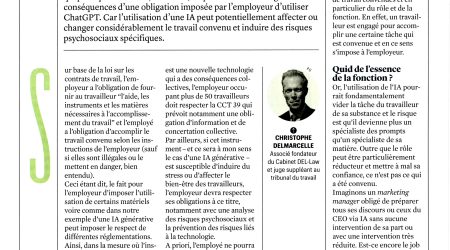Can a union representative say or write anything?
Posted the 12 December 2019In the current context, union representatives cannot, under the pretext of union freedom, attack certain workers in an insulting and/or defamatory manner, even under the guise of freedom of expression.
During the social elections, the situation can become extremely tense in certain companies, leading to very aggressive communications from employee representatives, especially union delegates. Can the employer and management team react in the event of the distribution of flyers or the hosting of a very aggressive blog against management, sometimes including personal attacks that are close to slander and/or inappropriate satirical drawings?
Employee representatives have the right and even the duty to inform the workers they represent.
The opportunity to revisit the scope and limits of union freedom of expression: can a union representative say or write anything? First, it is important to remember that, as confirmed by the Brussels Labor Court (June 21, 2018), employee representatives have the right and even the duty to inform the workers they represent.
While the right to freedom of expression is enshrined in the constitution, union freedom of expression is primarily affirmed at the international level through the reading of Articles 10 and 11 of the European Convention on Human Rights and by Recommendation No. 143 of June 23, 1971, by the International Labour Organization (ILO). Of course, when this freedom is expressed through leaflets, messages, blogs, or other drawings that directly attack individuals, it raises the issue of balancing this freedom with the right of everyone to have their honor and reputation respected. Especially since such actions occur within the framework of an employment contract, which typically implies the obligation to remain loyal to one's employer.
Vision restrictive
The European Court of Human Rights had the opportunity, particularly in 2009 and 2011, to address the issue of balancing and limiting the freedom of union expression in cases involving drawings or leaflets targeting other workers.
Although this ruling has been criticized, the Court adopted a rather restrictive view of this freedom, accepting that such drawings or leaflets exceeded the limit (even though satire is generally accepted as part of freedom of expression). The Court, based on the need for a climate of trust in the workplace and the specific nature of the employment relationship, judged that "an attack on the honor of individuals through grossly insulting or defamatory expressions within the professional environment has a particular severity due to its disruptive effects, justifying the imposition of severe sanctions." It deemed the dismissal for serious misconduct of the representatives involved to be neither illegal nor disproportionate.
In light of the question, this means that union representatives cannot, under the pretext of union freedom, attack certain workers in an insulting and/or defamatory manner, even under the guise of freedom of expression. For example, they cannot depict a staff representative, accused of supporting the employer, in a drawing showing them engaging in a sexual act with the human resources director...
Moreover, the few Belgian legal provisions also tend to interpret trade union freedom of expression restrictively.
Thus, Collective Bargaining Agreement (CCT) No. 5 of the National Labour Council stipulates that communications from the union delegation to the staff must have "a professional or union character." Article 4 further states that trade unions should encourage union representatives to "demonstrate at all times the spirit of justice, equity, and conciliation that conditions good social relations within the company."
"Maximum de correction"
Insulting, dishonoring, defamatory, or satirical communications could justify ordering the concerned representative to close their blog or remove the messages or leaflets and, if necessary, could even form the basis for a dismissal for serious cause (with attention to the procedure).
The Brussels Labor Court, in an old ruling from 1972, also reminded that a union representative "more than anyone else must show the utmost propriety considering their specially protected function"... Not to mention the possibility of a criminal complaint for harassment, defamation, or insult and/or the potential for damages. A well-informed delegate...
Related articles
Anti-money laundering policy

Is an employer allowed to mandate the use of artificial intelligence tools by employees ? (Trends, 17-07-2025)
